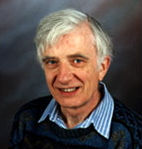 Ian Fleming has spent his entire career at the University of Cambridge where is currently a Fellow of Pembroke College. He received his BA degree in 1959 and his PhD (with J. Harley-Mason) in 1962. He enjoyed a highly productive postdoctoral year at Harvard University with R. B. Woodward working on the total synthesis of vitamin B12. A few years later, working on his own, he was the first to determine the full structure of chlorophyll, by proving the absolute configuration of the stereogenic centers in the macrocyclic ring, and he was the first to make the 8-cycloheptatrienylheptafulvenyl cation, which at the time held the record as the most stable known hydrocarbon cation.
Ian Fleming has spent his entire career at the University of Cambridge where is currently a Fellow of Pembroke College. He received his BA degree in 1959 and his PhD (with J. Harley-Mason) in 1962. He enjoyed a highly productive postdoctoral year at Harvard University with R. B. Woodward working on the total synthesis of vitamin B12. A few years later, working on his own, he was the first to determine the full structure of chlorophyll, by proving the absolute configuration of the stereogenic centers in the macrocyclic ring, and he was the first to make the 8-cycloheptatrienylheptafulvenyl cation, which at the time held the record as the most stable known hydrocarbon cation.
Dr. Fleming is best known for his work on organosilicon chemistry applied to organic synthesis, with which he has been heavily involved since 1972. He has consistently and extensively created solutions to problems in organic synthesis using organosilicon chemistry. His most recent work has concentrated on using the silyl group to influence the stereochemical course of the events in its neighborhood.
Dr. Fleming is a world renowned author who has written important reviews on organosilicon chemistry, most notably in the pioneering encyclopedia, Comprehensive Organic Chemistry, a major Organic Reactions chapter of over 500 pages on the electrophilic substitution of allyl and vinylsilanes and a mammoth review on the uses of silicon compounds in the control of stereochemistry in organic synthesis in Chemical Reviews. Most chemistry students are familiar with Dr. Fleming as the author of invaluable textbooks including Spectroscopic Methods in Organic Chemistry, (with Dudley Williams; Spectroscopic Problems in Organic Chemistry, (also with Dudley Williams) and Selected Organic Syntheses. His most influential textbook, Frontier Orbitals and Organic Chemical Reactions was the first to alert the organic chemistry community to the usefulness and applicability of a non-mathematical understanding of molecular orbital theory.
He was awarded the Tilden lectureship of the Royal Society of Chemistry in 1981 and the Prize for Organic Synthesis in 1983 for the early stages of this work, and in 1993 he was elected a Fellow of the Royal Society largely on the strength of his continuing contributions in the area of organosilicon chemistry.